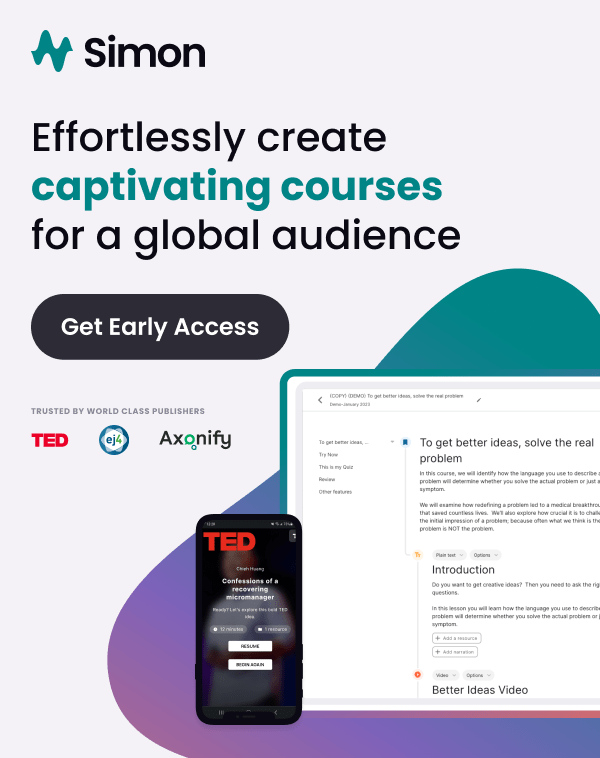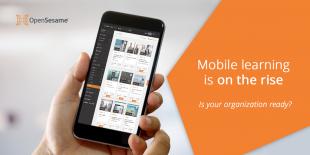Mobile learning – and the rise of mobile dominance, in general – is a topic that most learning and development (L&D) professionals have heard of. In fact, mobile learning is now so critical to online corporate training success that it has become an eLearning best practice.
However, the majority of organizations do not support mobile learning. In Brandon Hall Group’s Mobile Learning 2016 survey, 35% of organizations responded that “there is limited access to learning material via web browsers only”, while 25% of organizations responded that “there is no mobile interaction with learning at this time”.
Ignoring mobile as a critical element of your eLearning strategy will limit the accessibility of your learning content and will subject learners to a poor learner experience. Missed opportunities such as these will ultimately lead to poor L&D results, which is why it’s time to start seriously considering a mobile learning strategy.
Mobile Adoption: No Signs of Slowing Down
According to Pew Research, 77% of Americans now own a smartphone. Recent research by Google has also found that nearly 40% of people search only on a smartphone in an average day as they look to meet immediate needs. This adds up to an average smartphone usage of 170 minutes per day. As a result of this shift, more Google searches are happening on smartphones than computers. Similarly, KPCB reports that 87% of millennials say their smartphone never leaves their side.
These stats demonstrate humanity’s growing dependence on mobile devices (especially among millennials). As a result, a mobile experience isn’t something new that learners would have to adapt to – rather, introducing mobile learning is simply making learning easier and more accessible.
In addition to improving the accessibility of training materials, mobile learning also helps to:
-
Encourage learning on-the-go
-
Facilitate learning at the point of need
-
Improve social learning effectiveness
-
Increase learner adoption and engagement
Mobile is Becoming a Global L&D Priority
Owing to the many benefits listed above, organizations are finally starting to prioritize mobile learning. Brandon Hall Group survey data shows that 57% of organizations said that they did not yet have a formal mobile learning strategy in place, but that they were working on one.
The global market for mobile learning also appears to be experiencing fast growth. According to Ambient Insight’s 2014-2019 Worldwide Mobile Learning Market Forecast, the worldwide market for mobile learning products and services reached $8.4 billion in 2014. The forecast also anticipates that revenues will reach $14.5 billion by 2019.
Thankfully, new developments in learning technology are making it easier than ever to deliver mobile learning content. In particular, a state-of-the-art learning management system (LMS) can help to facilitate a smoother, more effective learner experience. For example, the Docebo mobile app allows learners to learn on-the-go, ask questions for subject matter experts, and access learning content at the point of need.
Mobile eLearning Content – What’s Most Effective?
According to the aforementioned Brandon Hall Group Mobile Learning 2016 survey, some of the most effective mobile learning types of content include:
-
Videos (27% say videos are highly effective via mobile)
-
Virtual classrooms (16% say virtual classrooms are highly effective via mobile)
-
Performance support (15% say performance support is highly effective via mobile)
Of course, the effectiveness of your learning content will vary between audiences, so it’s always a good idea to provide wide variety of learning content formats, topics, and types. More importantly, ensure your learning content is optimized for mobile devices by breaking it down into more digestible pieces (e.g., microlearning content), keeping file sizes small, and adding interactive elements.
Learn more about the rise of mobile learning in Docebo’s free report, Leveraging the Natural Synergy of Mobile Learning and MIcrolearning in eLearning. Download it today!
About the Author: Victoria Hoffman is a Content Specialist at Docebo. She is a graduate of University of Toronto’s Semiotics & Communication Theory Program and has 5+ years of experience in digital marketing. She enjoys writing and is always looking for a good book recommendation.




